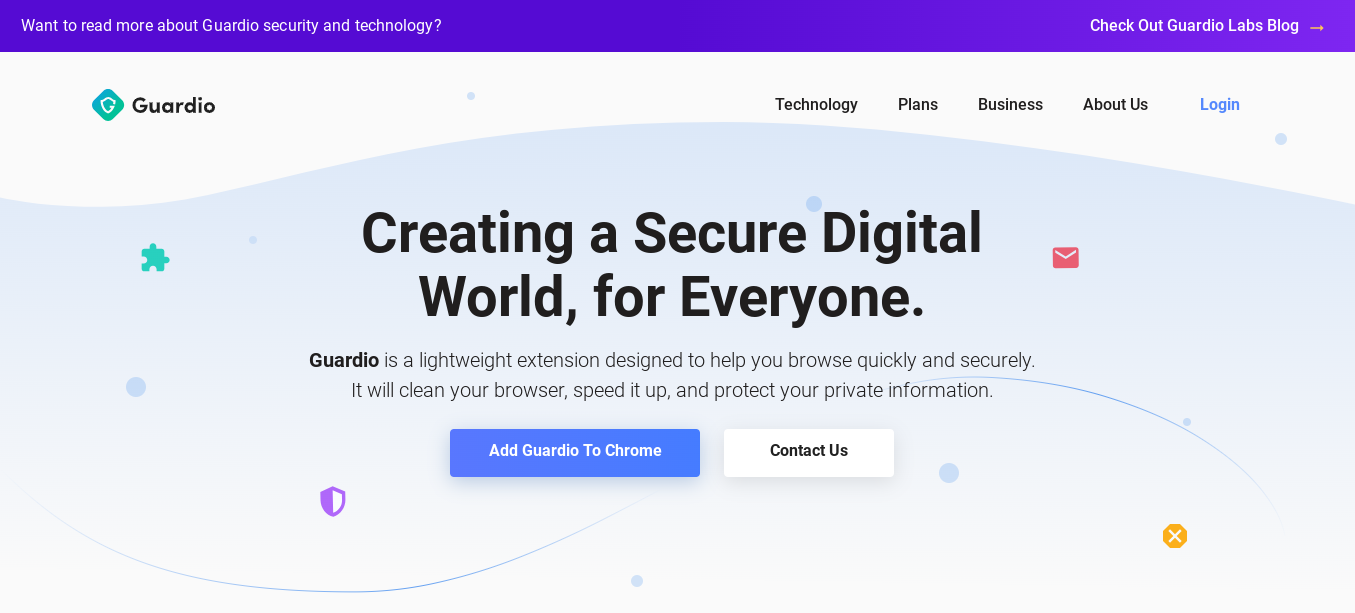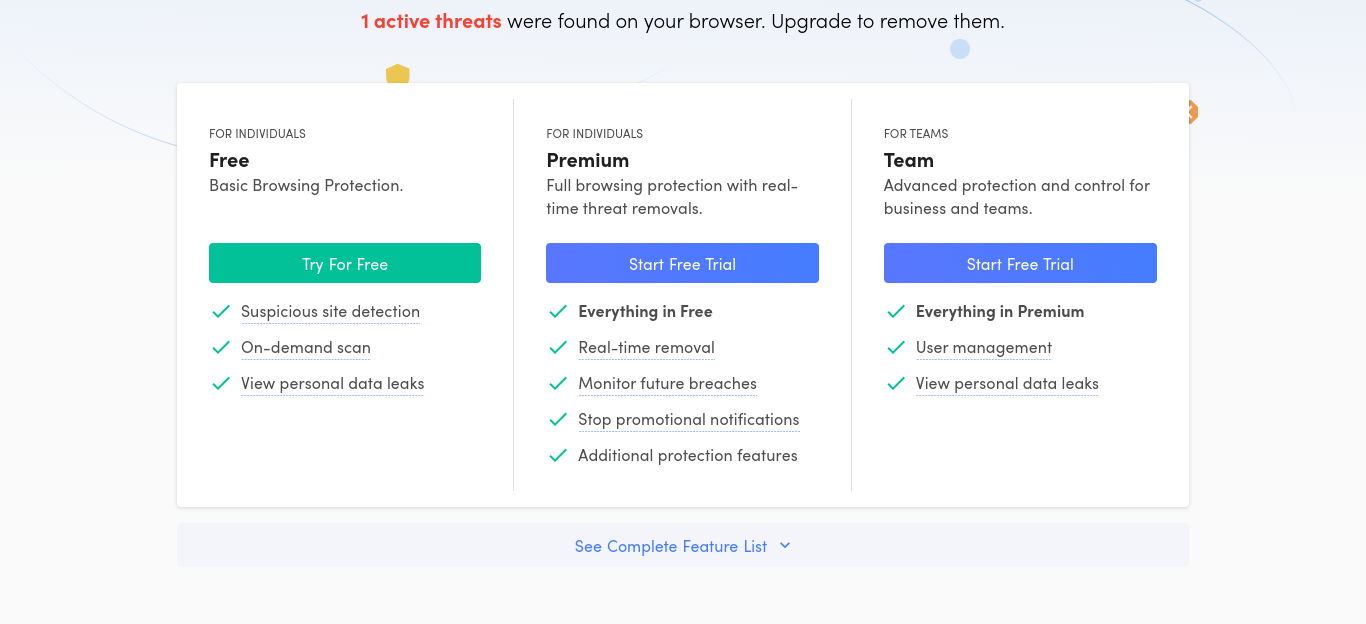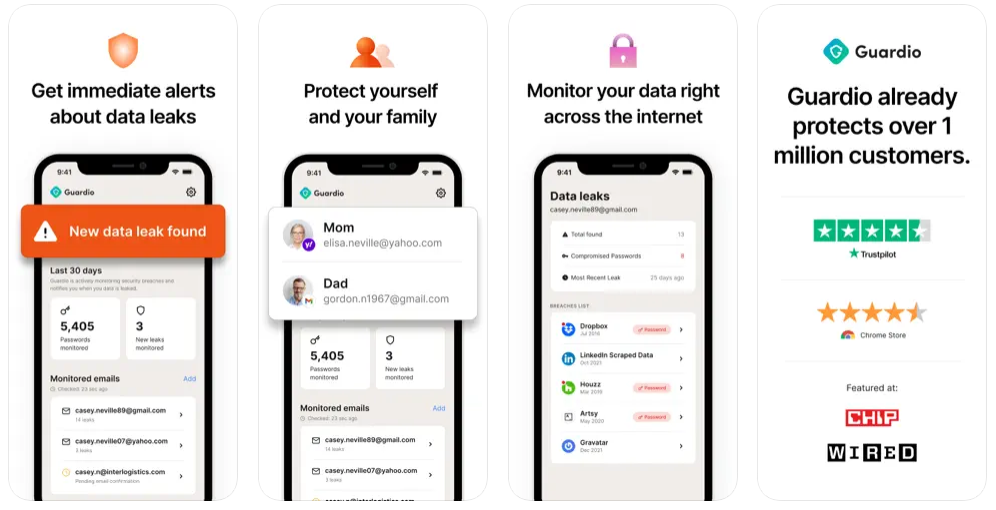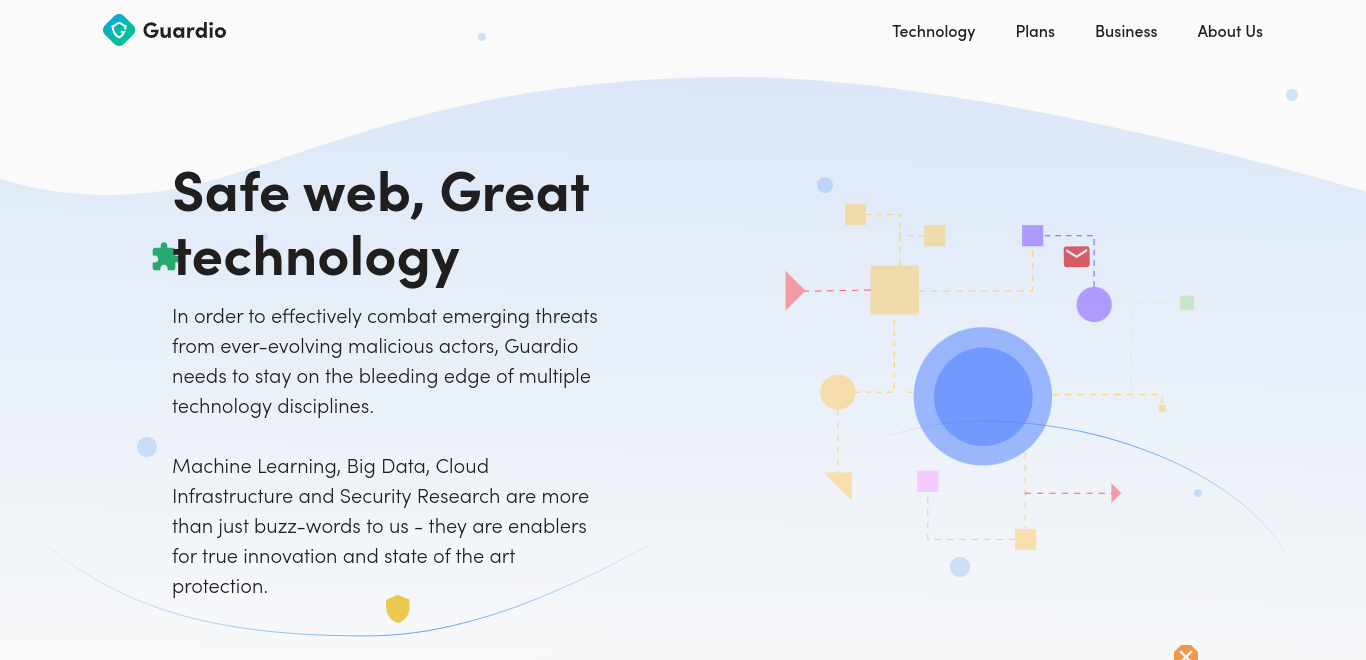Guardio: Antivirus Protection for Chromium-Based Browsers
Besides protecting against malicious and fraudulent web pages, most antivirus software eliminates active harmful programs and utilizes real-time protection to prevent further infestations. Guardio, on the other hand, blocks malware downloads and browser-based attacks. Its data-breach monitoring is good, but it can’t stop malware from non-Chromium browsers. We found it effective in our hands-on tests, but it’s pricey.
Bitdefender and McAfee offer browser-level protection like Guardio, but that’s not all. McAfee protects all your devices on all popular platforms, not just Chrome. Independent labs rate Bitdefender highly, and it has more functionality than most security suites. Our Editors’ Choice antiviruses are these two.
Specifications Of Guardio
| Weight | 440g |
| Standard | EN352 |
| Warranty | 1 year |
| Battery Time | Up to 120h |
| Bluetooth | Ja, v5.1 |
| Level Dependant | YES |
| Communication radio | 446 PMR |
What Is Guardio?
Browser extension Guardio provides security. Any Chromium-based browser like Chrome, Edge, or Opera supports it. It works just online and in the browser. Guardian doesn’t examine your device for malware, but its FAQs have been refined to be more accurate. Guardio scans every browser input, downloaded files, and websites. Guardio’s website says the in-browser technique is better than traditional antivirus programs since it analyses using machine learning. “Many traditional antiviruses rely on rigid block-unblock lists, lacking granular and real-time capabilities.” Like Guardio, many regular antivirus programs use this adaptable technology and can block dangerous and fraudulent websites.
What Is The Cost of Guardio?
Guardio costs $119.88 a year, or $9.99 per month. This subscription lets you share with four others, which is nice. It’s still pricey. Five licenses of ESET NOD32 Antivirus with Malwarebytes Premium cost $79.99 per year. Many cheaper antivirus programs exist. A five-license ZoneAlarm Pro Antivirus subscription costs $54.95, and Vipre Antivirus Plus costs similarly. McAfee Antivirus Plus is $64.99, half Guardio’s pricing. That allows you to safeguard all your Windows, macOS, Android, iOS, and ChromeOS devices with McAfee. These options offer device protection that Guardio lacks. One thing makes Guardio’s pricing more bearable. Synchronising Chrome instances spread Guardio to protect them. Every desktop instance. That applies to all five users. Five protected users with unspecified devices are provided.
Getting Started With Guardio
Choose the Guardio extension from the Chrome Web Store to install after purchasing your subscription. All users get a seven-day free trial before being charged. After a fast installation, Guardio scans the browser for unwanted pop-ups, harmful sites, data leaks, harmful apps, and system health. All elements except Data Leaks were checked on my test system. System Health was the lone green checkmark. Unwanted Pop-ups were marked amber and “Medium Risk.” Dangerous Sites and Apps received red checks and “High Risk.” Yet enlarging those four revealed no issues. It’s not unexpected that the scan missed dozens of hazardous programs in my test folders. Guardio remains in the browser. I skipped correcting leaks, planning to discuss them later.
The Guardio dashboard opens after the scan, including a brief feature tour and a Getting Started video. The simple main window contains a left-hand menu with Overview, Browsing, Extensions, Notifications, Identity, Hijackers, and Email Protection. Each page has simple options and a list of related activities.
The Overview page has a huge banner asking you to enroll up to five email accounts for breach monitoring. Below that, six panels show significant activity: Harmful Site Blocks, Data Leaks, Suspicious Sites Visited, Extensions Neutralised, Hijackers Blocked, and Push Sources Blocked. These are menu choices, and clicking a stat opens the relevant page. The system information panel and link to report security concerns Guardio didn’t fix are also there.
Naturally, No Lab Test Results
I closely monitor four global antivirus testing lab reports. Multiple excellent ratings indicate a product’s effectiveness. AV-Test Institute and AV-Comparatives test each app’s capacity to detect local malware and behaviorally detect malware samples statically. Guardio doesn’t identify malware outside the browser, so they shouldn’t try it—the same is true for MRG-Effitas. SE Labs tests different antivirus tools with web-based assaults using capture and playback. That method is closest to Guardio. However, it may need tweaking.
Great Malware Download Defence
I test real-time antivirus protection by accessing folders with malware I’ve collected and analyzed. Some programs kill known criminals on sight. Some wait for malware launch. Applying this test to Guardio is problematic because it only does something outside the browser. It cannot scan external programs outside Chrome. Instead, it analyses downloaded files for one pass at protection.
I had to adapt my test to Guardio’s restrictions. First, I uploaded my sample folders to cloud storage and created sharing links. I then labored over downloading the six dozen files. Guardio usually stops the virus download and displays a tiny message. The product with the highest score from this newest collection detected 98% of samples and scored 9.8 out of 10. Webroot SecureAnywhere AntiVirus ranks second (9.4).
My second batch of examples is slightly adjusted. I alter the filename, attach nulls to change its size, and replace some non-executable bytes in the program for each file. Most antivirus tools detect modified samples; some catch-all. Not Guardio. All altered samples except one dropped into the Downloads folder. While hand-modified malware is unlikely, this test suggests that Guardio’s malware download detection methods are more versatile than intended.
Can Guardio eliminate pop-ups?
Guardio blocks pop-ups that lead to fraudulent sites. We turn off browser malware that serves pop-ups. However, we cannot block valid pop-ups from some sites and platforms. You may get a pop-up to subscribe to a pizza delivery service or a vehicle ad while watching a video online. Guardio allows these because sites profit from them. While bothersome, it’s not hazardous. What distinguishes Guardio from ad blockers? Adblockers come in many forms. Their purpose is to block ads while browsing. Ads can be unpleasant and hinder page loading. Because they want you to see their adverts, some sites won’t let you read their content if you turn off ads.
The flip side of pop-up ads could be better. Guardio beats most ad blockers here. These pop-ups often lead to fraudulent websites that fool you into installing malware or phishing your info. Additionally, pop-up advertising and notifications may indicate adware or other malware on your browser. This is where Guardio shines because it fights malware. Installing the Guardio browser extension eliminates malware, including adware that sends you unwelcome notifications and adverts. Ad blockers block legitimate adverts, while Guardiola blocks the source of ads that may compromise your security.
Pros and Cons Of Guardio
| PROS | CONS |
| Top marks in all hands-on testing | Outside of the browser, there is no antivirus protection. |
| Five people can subscribe. | |
| Effective data breach reporting |
Should I Get One?
Guardio offers benefits. If you have Chrome Sync enabled, installing it once protects all desktop Chrome installations. Guardio lets you share it with four friends or family members who can register five email addresses for data breach monitoring. Guardio’s breach monitoring is well-designed and welcome, as most security providers reserve it for suites. It scored well in our hands-on tests, although Guardio’s restrictions necessitated some modifications.
The top full-scale antivirus programs match Guardio’s protection against harmful and fraudulent websites and go further. They install on browsers other than Chrome and manage malware that arrives without the browser.
FAQs
What does Guardio offer?
Guardio protects Chrome users from phishing attempts and harmful websites, making it a trustworthy cybersecurity first line of defense.
How effective is Guardio over naked Chrome?
Guardio prevented 177% more phishing attacks and flagged 177% more harmful URLs than naked Chrome, demonstrating its online security.
Guardio targets and protects whom?
Guardio protects elderly and phishing-vulnerable web users against crypto extension scams and dangers, making it useful for typical web users.





















